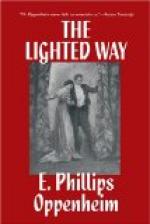“Are you not afraid,” she asked, “that I shall consider you a very inquisitive young man?”
“I am afraid of nothing of the sort,” Arnold replied. “Mr. Weatherley’s disappearance is too serious a matter for me to take such trifles into account.”
She pointed to the letter which still lay upon the table.
“Is it not his expressed wish that you should make no effort towards solving the reasons for his disappearance?”
“There is no reason,” Arnold answered, doggedly, “why one should not attempt to understand them.”
Mr. Jarvis had finished his telephoning. Fenella went up to him with outstretched hand.
“Mr. Jarvis,” she said, “there is nothing more I can do here. I am very much upset. Will you take me out to my car, please? I know that you will do the very best you can without Mr. Weatherley, and I am glad that you have Mr. Chetwode to help you. I would come down myself sometimes,” she added, “but I am sure that I should only be in the way. Good afternoon, Mr. Chetwode.”
“You have not answered my question,” he persisted.
She looked at him as a great lady would look at a presuming servant.
“I see no necessity,” she replied. “I am too much upset to receive visitors to-day. If you are ready, Mr. Jarvis.”
She left the room without even a backward glance, closely followed by the cashier. Arnold stood looking after the retreating figures for a moment, then he turned away with a hard little laugh. Once more he read and re-read Mr. Weatherley’s letter. Before he had finished, Mr. Jarvis came bustling back into the room.
“Well!” he exclaimed, dramatically. “Well!”
Arnold looked across at him.
“It’s a queer business, isn’t it?” he remarked.
“Queer business, indeed!” Mr. Jarvis repeated, sitting down and wiping his forehead. “It’s the most extraordinary thing I ever heard of in my life. One doesn’t read about such things even in books. Mrs. Weatherley seems to take it quite calmly, but the more I think of it, the more confused I become. What are we to do? Shall we go to the police or write to the newspapers? Can’t you suggest something?”
Arnold finally laid down the letter, which he now knew pretty well by heart.
“It seems to me, Mr. Jarvis,” he said, “that the thing for us to do is to obey orders. Mr. Weatherley expressly writes that he wishes us to take his absence, so far as possible, as a matter of course, and to look after the business. The very fact that he puts it like that makes it quite clear to me that he intends to return. My idea is that we should follow the lines of his letter strictly.”
“You are quite right, Chetwode,” Mr. Jarvis decided. “I feel exactly that way about the matter myself. We’ll go right ahead with those orders now, then, and we can have a chat about the matter again after business hours, if you don’t mind. It’s hard to reconcile oneself to taking this so easily, but I suppose it’s the only thing to do. I’ll get out in the warehouse now. You had better send that note round to Turnbull’s by express messenger, and ring up Yardley’s about the American contracts.”




